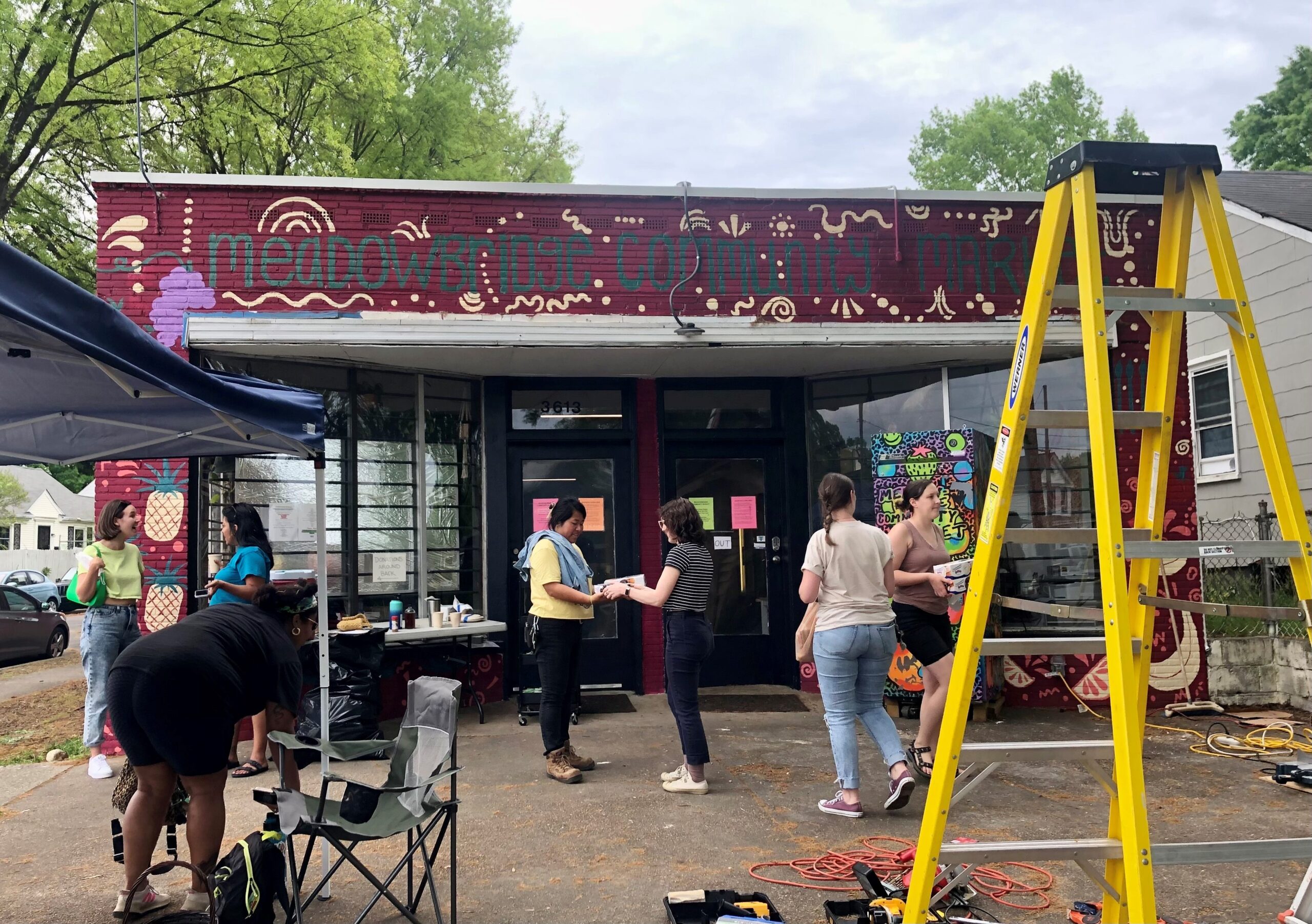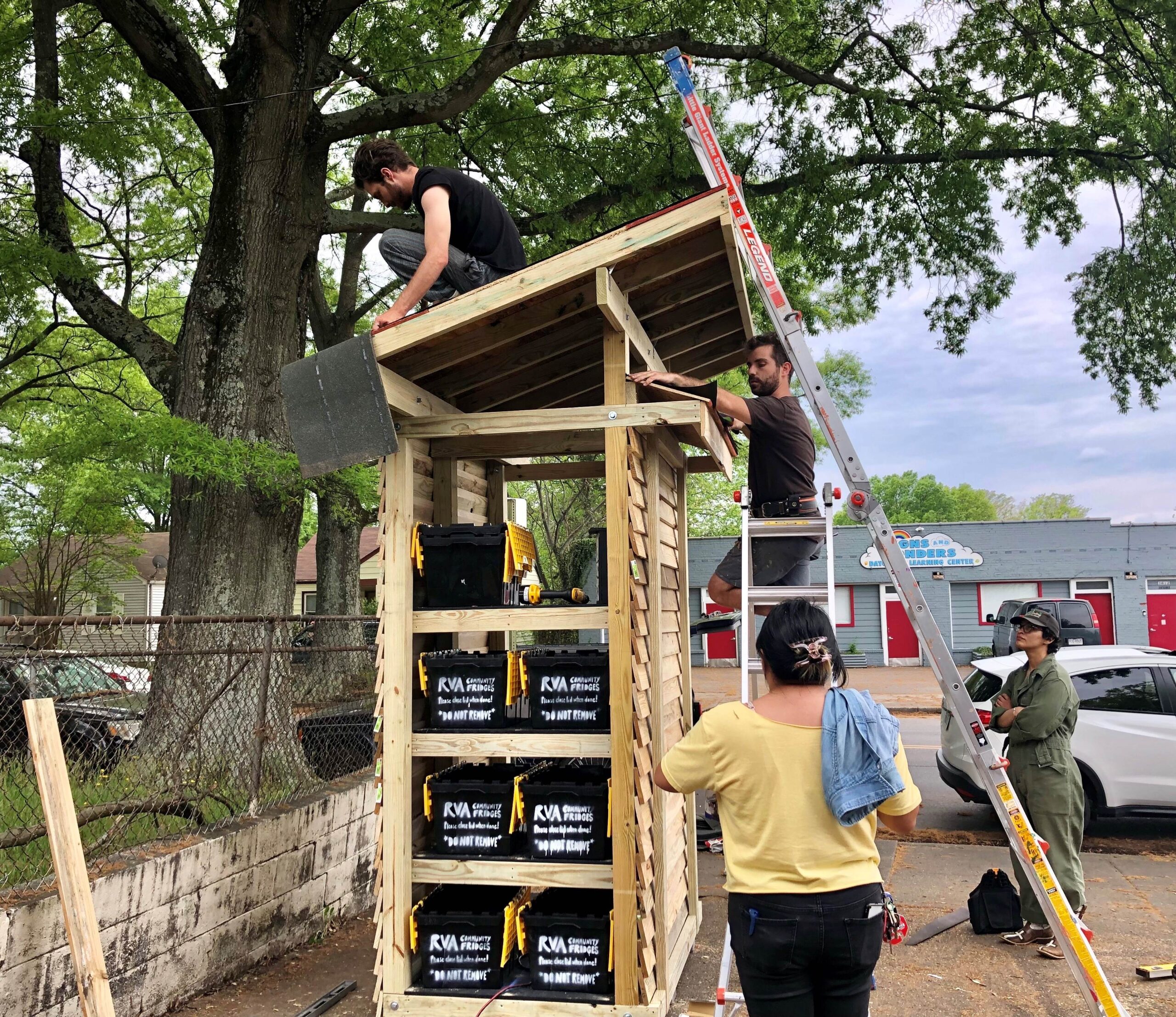
RVA Community Fridges volunteers help pack up after the general body meeting at the Meadow Bridge Community Market on April 16. (Photo by Jackie Llanos)
By Jackie Llanos
Every afternoon, from lunchtime to evening, Michelle Redd stands by a stoplight at the intersection of Lauburnum Avenue and Chamberlayne Road holding a sign asking for help. She has been standing there every afternoon for six months.
But now, with summer coming on, her situation is becoming more difficult.
“It’s hot out here, and it’s going to be almost 90 tomorrow,” she said. But the Northside native still planned on being at the same spot next to a church because people here are generous. Redd endures the sweltering heat hoping to collect enough money to pay $75 weekly for a nearby room. After she makes that rent, she worries next about food.
Some of the people driving by come back to bring her food, she said — a welcome addition to the donated food she sometimes receives from local churches and organizations. The small sign she holds is made from a box of Bagel Bites she got from a church.
“The organizations have been good with helping people get out of the streets,” she said.
The newest project tackling food insecurity opened last week about a 30-minute walk from Redd’s spot. It’s on the northern edge between North Highland Park and Providence Park, where residents driving by roll down their windows to see what’s become of the old coin laundry place. It’s now a free grocery store that includes a Community Fridge stocked with donated perishables.
Though the refrigerator on Meadow Bridge Road is not the first to be installed in Richmond—the mutual aid organization RVA Community Fridges operates 10 in the city—the collaboration with the free grocery store, open on Tuesday and Saturday, is expanding access to fruits and vegetables in a neighborhood surrounded by convenience stores. The grocery store offers a wider variety of food and hygiene items than the Fridge does, but the Fridge’s 24/7 availability fills in the gaps during the five days the store isn’t open.
One thing that Taylor Scott, the energetic founder of RVA Community Fridges, wants to make clear is that this is mutual aid, not charity. It’s the community caring for one another, not just dropping off food past its expiration date
“We don’t got to sell our souls,” she said.
Learning about the history of the neighborhoods is an essential part of the organization’s mission.
“It’s really nice to be able to come to Fridges, talk to people that have lived here for decades—great grandparents or whoever they may be—and just learn from them,” she said.
Richmond’s history of redlining continues to affect the Highland Park area. Although it was not completely redlined in the 1930s, the neighborhood was classified by Home Owners’ Loan Corporation as “definitely declining,” according to research from the Digital Scholarship Lab at the University of Richmond. It continues to suffer high rates of poverty combined with poorer measures of health and life expectancy.
The grand opening of the Fridge felt more like a potluck. Volunteers gathered under a tent in front of the free store and shared vegan and vegetarian dishes as part of the crew’s general body meeting.
Through the music and laughter, they discussed next steps for the organization and some of the challenges they are facing. RVA Community Fridges has grown at an unexpected pace since Scott opened the first Fridge in 2021, after moving from New Orleans to Richmond in 2016 to attend Virginia Commonwealth University. She wanted to be an FBI agent, but the COVID-19 pandemic had other plans for her.
“I would have never thought that we’d be here today,” Scott said. “I had no plans to continue putting up Fridges when I put the first one up. So it was really just like the continued support and love from everybody was just so overwhelming that it didn’t make sense to stop, honestly.”

Volunteers put the finishing touches on the shelter for the fridge and pantry. Protecting the fridges from weather damage is essential because it is difficult to repair or replace them if they break. (Photo by Jackie Llanos)
Now, Scott and the volunteers are navigating bureaucracy to legitimize the network of Fridges and related pantries as a tax-exempt organization. This step would allow farms and restaurants that provide food for the Fridges to claim donations on their taxes, which would incentivize more partnerships with the organization.
Members of the communities where Fridges are located and volunteers drop off food daily, so the influx of food is not an issue for the organization. But with volunteers putting in more and more hours, Scott and the other coordinators feel that they need to start paying them, she said. She gives an example: To install the Meadow Bridge location, four volunteers spent half a day sawing the wood, drilling planks for the structure and hammering roof shingles to build the shelter that is going to protect the Fridge from weather damage.
Once the shelter was done, Scott and the other volunteers pushed the industrial-grade Fridge from the side of the store and pulled it onto the platform. The volunteers cheered.
“I feel like we’re saying thank you to the community by putting this here,” Scott said.
